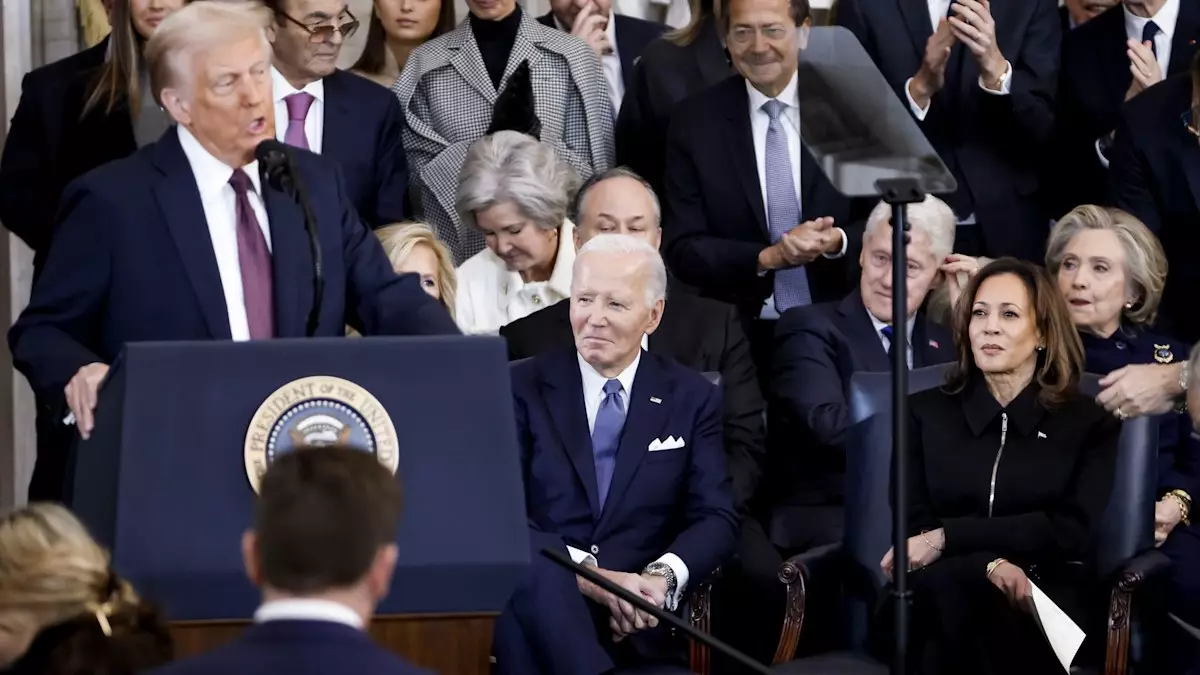In a discourse characterized by defiance and grand promises, Donald Trump took center stage on inauguration day, delivering a speech that resonated profoundly with his supporters. However, the implications of his rhetoric extend far beyond mere partisan politics; they reveal much about the current landscape of American politics and its turbulent climate.
The atmosphere during Trump’s inaugural address was emblematic of a sharply divided nation. Seated prominently in the front row were Joe Biden and Kamala Harris, whose stoic demeanor contrasted starkly with Trump’s energetic and confrontational style. The palpable tension reached a crescendo when Trump directed pointed criticisms toward Biden, alleging that he was incapable of handling even the simplest of domestic challenges. This direct assault illuminated a broader battle between differing visions for America’s future, one that underscores the polarization that has come to define modern political exchanges.
Trump’s assertion that he had faced unprecedented challenges during his presidency invited listeners to consider the historical context of his administration. He painted a narrative where his time in office was a constant battle against forces that sought to undermine him, framing himself as a figure of resilience amidst chaos. This self-portrayal served not only as a reaffirmation of his leadership but also as an appeal to those who felt disillusioned with the political status quo. By asserting that he had survived attempts on his life, including references to a recent assassination attempt that narrowly missed him, Trump positioned himself as a martyr for American values, convinced that destiny ordained him to restore the nation’s greatness.
Trump explicitly referred to his recent electoral victory as a “mandate,” which he interpreted as a compelling call to action against perceived grievances and betrayals suffered by the American populace. He formulated a vision steeped in the retrieval of national pride and rectitude, stating that the time has come to halt what he described as America’s decline. This stark dichotomy sets the foundation for an ambitious agenda that purportedly aims to restore “faith, wealth, democracy, and freedom” among citizens. Such sweeping promises paint a picture of a hopeful restoration, yet they also raise questions about feasibility and accountability.
As the speech unfolded, Trump articulated specific policy initiatives meant to reinforce his vision for America, including stringent immigration reforms and reasserting American influence over the Panama Canal. Additionally, the declaration of a “national energy emergency” signaled a proactive stance towards economic innovation and growth. The underlying message was clear: an invocation to embrace American exceptionalism and reclaim a position of dominance on the global stage. However, the practicality of these declarations remains uncertain, as they hinge on broader support and the complex realities of governance.
Culminating in his vision of a forthcoming “golden age,” Trump pledged to revive a sense of national unity and strength. His words were interspersed with fervor, envisioning an America characterized by compassion, courage, and respect—an idealistic representation of a nation that many long for yet find increasingly elusive. The vision extends beyond mere national pride; it seeks to forge a new identity for America in a world rife with conflict and upheaval. The call for a prosperous and formidable nation resonates deeply with a public yearning for stability amid chaos.
In the face of his assertive proclamations, Trump’s speech also echoed the inevitability of challenges that lie ahead. He assured listeners that America would not be subdued or intimidated, reiterating a mantra of resilience. By employing powerful rhetoric and evocative imagery, he framed himself as the quintessential protector of American values, inviting his audience to partake in a collective journey toward revival. For supporters, this rallying cry serves as a beacon of hope; however, for skeptics, it raises concerns regarding the rhetoric of division and the potential consequences of such stark partisan lines.
In sum, Trump’s inauguration speech was a reflection of the complexities within American society today—combining bold claims, a vision for the future, and an acknowledgment of testing times. The crossroads at which America now stands demands introspection and dialogue, and Trump’s words will undoubtedly ignite conversations about the nation’s trajectory in the years to come.

